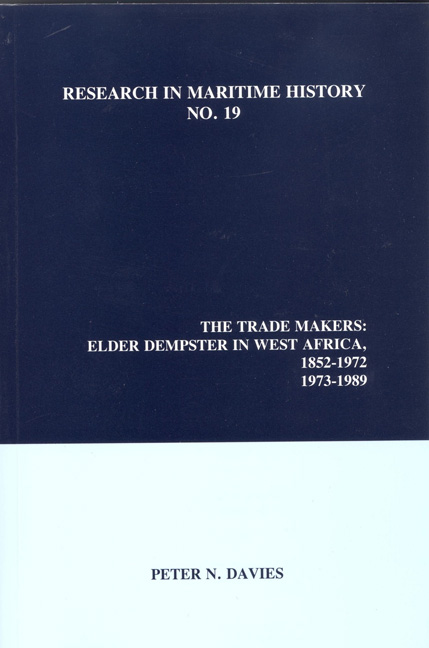Book contents
- Frontmatter
- Table of Contents
- List of Illustrations
- Foreword
- Introduction (Second Edition)
- Foreword
- Preface
- Acknowledgments
- Introduction to the Original Edition
- Frontispiece
- Part One The Pioneers
- Part Two Elder Dempster And Company
- Part Three Elder Dempster And Company Limited
- Part Four Elder Demster Lines Limited
- 11 The Reorganisation of the Company
- 12 The Second World War
- 13 Post-War Reconstruction
- 14 Recent Developments
- 15 The Future
- Part Five The End Of An Era
- List of Appendices
- Appendices
- Bibliography
- Index
14 - Recent Developments
from Part Four - Elder Demster Lines Limited
- Frontmatter
- Table of Contents
- List of Illustrations
- Foreword
- Introduction (Second Edition)
- Foreword
- Preface
- Acknowledgments
- Introduction to the Original Edition
- Frontispiece
- Part One The Pioneers
- Part Two Elder Dempster And Company
- Part Three Elder Dempster And Company Limited
- Part Four Elder Demster Lines Limited
- 11 The Reorganisation of the Company
- 12 The Second World War
- 13 Post-War Reconstruction
- 14 Recent Developments
- 15 The Future
- Part Five The End Of An Era
- List of Appendices
- Appendices
- Bibliography
- Index
Summary
The Post-War Era
The disruption engendered by the Second World War was followed by a period of reconstruction which may be said to have been completed by about 1950. This is not to suggest that the 1939 situation had been restored, for many permanent changes had taken place, but rather that most of the short-term effects of the war had by then been either remedied or greatly modified.
It is the longer-term changes which must now be considered, and these were essentially of a much more fundamental nature than any previously examined. The basic causation was the move towards political and then economic independence by the West African colonies of the European powers, but this prime factor was closely allied to the greatly accelerated speed of technological progress. Neither of these movements had been instigated by the war, but both had received a tremendous boost during the period of hostilities, and together they were to be responsible for the rapid evolution which occurred in the fifties and sixties.
In the British West African possessions the administration had been consciously preparing its subjects for independence, but this had been envisaged as taking place in the far-distant future. Consequently, the demands for fuller representation were at first received with little sympathy, but such was the “wind of change” that full autonomy was granted to Ghana in 1956; to Nigeria in 1960; and to Sierra Leone and the Gambia in 1961 and 1965, respectively. As other European powers were simultaneously engaged in altering their relationships with their own colonies, West Africa was quickly transformed to a region where most states enjoyed freedom from much external direction.
The very force of these developments and of the economic changes which followed intensified many problems within West Africa and could have provided a potentially serious threat to the future of Elder Dempster's traditional trade. In fact, the new circumstances were accepted as a fresh challenge by the Company and, in spite of numerous setbacks, it was able to retain a substantial share of the West African shipping business throughout the sixties. This was a great tribute to Elder Dempster's adaptability and efficiency and thus, to a large extent, to its board of directors.
- Type
- Chapter
- Information
- The Trade MakersElder Dempster in West Africa, pp. 297 - 338Publisher: Liverpool University PressPrint publication year: 2000

